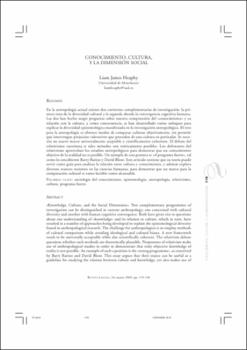Conocimiento, cultura y la dimensión social
Author
Heaphy, Liam JamesDate
2009Abstract
En la antropología actual existen dos corrientes complementarias de investigación: la primera trata de la diversidad cultural y la segunda aborda la convergencia cognitiva humana. Las dos han hecho surgir preguntas sobre nuestra comprensión del «conocimiento» y su relación con la cultura, y como consecuencia, se han desarrollado varios enfoques para explicar la diversidad epistemológica manifestada en la investigación antropológica. El reto
para la antropología es obtener modos de comparar culturas objetivamente, sin permitir que intervengan prejuicios valorativos que proceden de una cultura en particular. Se necesita un nuevo marco universalmente aceptable y científicamente coherente. El debate del relativismo cuestiona si tales métodos son teóricamente posibles. Los defensores del relativismo aprovechan los estudios antropológicos para demostrar que un conocimiento objetivo de la realidad no es posible. Un ejemplo de esta postura es «el programa fuerte», tal
como lo concibieron Barry Barnes y David Bloor. Este artículo sostiene que su teoría puede servir como guía para analizar la relación entre cultura y conocimiento, y además explora diversos avances recientes en las ciencias humanas, para demostrar que un marco para la comparación cultural es tanto factible como alcanzable. Two complementary programmes of
investigation can be distinguished in current anthropology; one concerned with cultural
diversity and another with human cognitive convergence. Both have given rise to questions
about our understanding of «knowledge» and its relation to culture, which in turn, have
resulted in a number of approaches being developed to explain the epistemological diversity
found in anthropological research. The challenge for anthropologists is to employ methods
of cultural comparison while avoiding ideological and cultural biases. A new framework
needs to be universally acceptable while also scientifically coherent. The relativism debate
questions whether such methods are theoretically plausible. Proponents of relativism make
use of anthropological studies in order to demonstrate that truly objective knowledge of
reality is not possible. An example of such a position is the «strong programme», as conceived
by Barry Barnes and David Bloor. This essay argues that their stance can be useful as a
guideline for studying the relation between culture and knowledge, yet also makes use of more recent developments in the human sciences to demonstrate that a framework for
cultural comparison is both plausible and realisable.





